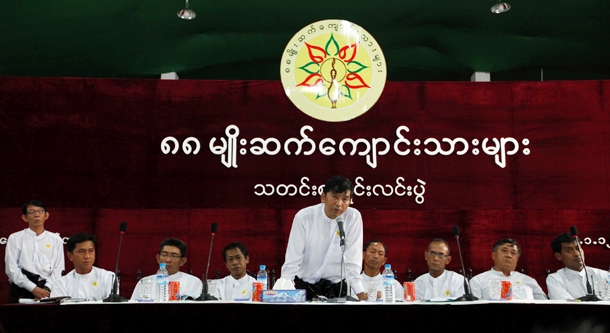The 88 Generation Students, the most prominent civil society group formed from the 1988 crushed democracy uprising, is seriously considering whether to form a political party in the near future, according to its leaders.
“We have repeatedly talked about this since our first press conference following our release from prison,” Ko Ko Gyi, one of the group’s leaders, told The Irrawaddy. “We will make an official announcement once we have decided. Until now, we are still seriously thinking about it.”
Mya Aye, another leader of the group, said one day his colleagues may follow their own paths which could include involvement with political parties. “I think in the future some may join or form a political party while others will remain with civil society and non-governmental organizations,” he said.
Moe Thee Zun, the former chairman of the All Burma Students’ Democratic Front, wants the 88 Generation Students to steadfastly remain as a social force.
However, the former student leader said he would also support them were they were to join Burma’s main opposition National League for Democracy (NLD) or form a political party of their own.
“I’d like to urge the leaders of the 88 Generation Students group to join the NLD. It will be better and more convenient for them,” said Moe Thee Zun. “The NLD will be stronger because of their participation. They, as a new generation, will also carry on the party’s leadership role.
“It is very difficult to form a new political party and keep it running for a long time,” said Moe Thee Zun, who also served as the chairman of the Democratic Party for a New Society before his departure to the Thai-Burmese border in 1989.
He added that if the 88 Generation Students plan to form a political party in the future they will need to be well prepared to tackle many difficulties and challenges along the way.
According to an NLD source, the party is open for the 88 Generation Students to join.
While visiting the United States, the NLD Chairwoman Aung San Suu Kyi recently said that it was impossible for the 88 Generation Students to stay in the same form in a long run because the groups consists of those with artistic capacities as well as social and political enthusiasm.
The 88 Generation Students, however, said they will base their decision upon its political and social impact.
Ko Ko Gyi said he and his colleagues often consider to which sectors they could best contribute during Burma’s current program of political and economic reforms. Even though each member of his group may have personal strengths and focus on specific areas, they will all remain under the same banner, he added.
“There will be a group among us who will particularly focus on politics. Likewise, there will be others who will be actively involved in social activities,” said Ko Ko Gyi. “Whatever we decide, it will not be a split between us. We will just share responsibilities to reach our common goal.”
Mya Aye echoed the views of Ko Ko Gyi.
“Like Suu Kyi said, our group comprises those with specific interests—social, political, artistic, etc. So I think we will choose our own way one day. It doesn’t mean we will split. We won’t.” he said.
Mya Aye added that supporting Suu Kyi is a policy of his group and it is vital for all democratic forces to stand in unity while understanding her current position. “To make it clear, the 88 Generation Students group is not a rival to the NLD. We don’t even think about competing with it. Our policy is to surround it,” stressed Mya Aye.
“Suu Kyi is in a very difficult position,” he added. “So we won’t accept any blame on her for something that doesn’t happen right away.”
Meanwhile, the 88 Generation Students have faced criticism both in and outside of Burma for favoring President Thein Sein’s new government and befriending solicitors of businesses close to the administration.
Ko Ko Gyi, however, said that the general public must decide whether to believe the allegations. “Each person and organization has its own history,” he said. “They have evidence for what they have done.
“We have our own evidence for how we got involved in workers’ strikes and land confiscation cases, and what we are doing in the current peace process. The general public will make their decisions.”
Min Ko Naing, the founder and most prominent leader of the group, recently canceled a trip to the United States to receive a democracy award as his colleagues’ passport applications were still pending, which he said was a denial of their citizens’ rights.
All group members have since been granted travel documents but still insist that they have no immediate plans to travel outside Burma despite being invited for study trips, human resource development training and seminars abroad.

















